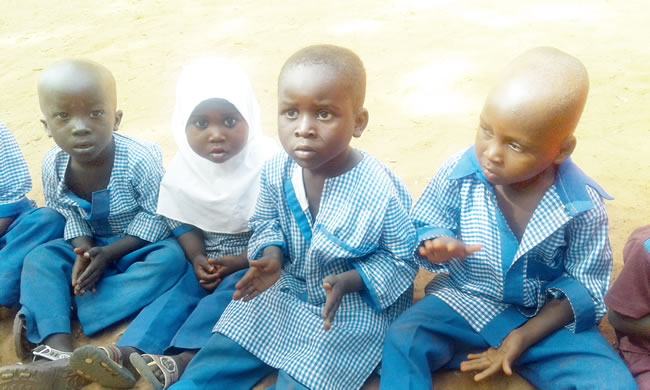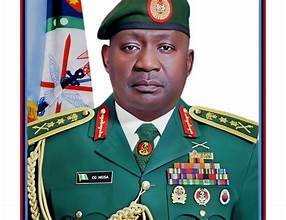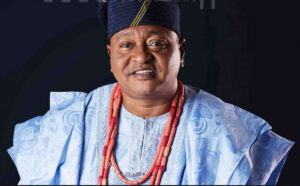Early childhood education: Stakeholders worry over implications of decline in enrolment
[ad_1]
CLEMENT IDOKO writes that the report by the United Nations Children’s Fund (UNICEF), which indicated that 10 million children under five are not enrolled in schools in Nigeria requires concerted efforts by all stakeholders including all tiers of government to redress in view of the potential benefits of enrolling a child in Early Childhood Education.
For Alamin Sani and many of his peers, learning through play and activity-based classes make them happy and greatly arouse their interests in pursuing their education as it was observed that the kids spoke about their future ambition with so much confidence.
“I want to be President of Nigeria in future to be able to help people and my community,” Alamin Sani said, speaking through an interpreter.
Nigerian Tribune gathered that the Shagari Local Government Area of Sokoto, which is about 40 kilometres from Sokoto metropolis, was named after the late Nigerian leader, Alhaji Shehu Shagari.
Alamin Sani’s response to his life ambition and many other children in the Early Childhood Care Development Centres in Sokoto, demonstrated the importance of enrolling a child for Early Childhood Education which is primarily play-based, with experts saying that the ECE has the capacity to open up a world to a child where everything is possible.
Early Childhood Care and Development Education (ECCDE) in its earliest form in Nigeria was provided for the few children whose parents could afford the fees charged largely by private providers of the services. With the launching of the Universal Basic Education Programme in 1999 and the increasing recognition of ECCDE or pre-primary education as providing a head start in life for all children, the government initiated policies and programmes that encouraged public primary schools to also provide ECCDE services even in remote rural schools in Nigeria.
This form of education encompasses crèche, nursery or kindergarten, which normally takes place between the ages of 0-4 years and pre-primary (age 5 years) (FRN, 2014) respectively.
However, the Universal Basic Education (UBE) Act (2004) defines ECCDE as education offered to children aged 3-5 years, while a National Council on Education (NCE) decision in 2014 recognises pre-primary education for children aged five years as part of the UBE programme.
The Country Director, Early Childhood Development Initiative (ECDI) in Nigeria, Dr. Amy Panyi, captured this succinctly when she said ECE creates opportunity for learners to explore, innovate, collaborate, develop self-confidence, critical thinking, creativity, and curiosity. These were some of the attributes found in some pupils in some ECE centres visited in Sokoto State, including that of Magaji Abdullahi ECCD Nursery & Primary School, Shagari as exemplified by Alamin Sani.
A report by the United Nations Children’s Fund (UNICEF), indicated that 10 million children under five years are not enrolled in schools in Nigeria
Stakeholders are therefore worried that as important as ECE, it is given scant attention by both federal and state governments, thereby contributing to the high number of out-of-school children and the learning crisis in Nigeria. With over 10.2 million out-of-school children, Nigeria is ranked top of countries with a high number of school age children not attending school.
Concerned by the development and given that education is a right of a child, the Child Rights Information Bureau (CRIB) of the Federal Ministry of Information and Culture in collaboration with the United Nations Children’s Fund (UNICEF) organised a two-day media dialogue on Early Childhood Education (ECE) in Sokoto State on the need to create awareness and advocacy around ECE in the country.
The media dialogue saw over 40 journalists and experts coming together to brainstorm on the need for the issues around ECE to be put on the front burner, while also setting agenda for political parties and candidates gunning for elective offices in the 2023 general elections, to prioritise Early Childhood Education as a cornerstone for the development of Nigeria.
During a field trip to some select schools with ECCD centres in Sokoto, it was quite evident that in spite of some successes recorded a lot is needed to be done to reposition ECE in Nigeria. For instance at Magaji Abdullahi Early Childhood Care Development Nursery & Primary School, Shagari, children sit on bare ground in the school compound to learn during “Morning Circle”, which could expose them to different kinds of diseases. It was also observed that the school had no water, not even a borehole to provide water for regular washing by teachers and pupils.
On the number of teachers, the Head Teacher of the school, Kulu Bala, said the ECCD Center has 16 teachers, which she claimed was adequate to handle all the 200 pupils enrolled in ECE in the school. There was however, the issue of poor remuneration and lack of motivation as one of the Head Teachers, told Nigerian Tribune in confidence that she has put in for about 33 years as a teacher and receiving N34,000 at the end of the month.
The Head Teacher, Kulu Bala, particularly said there was the surge in enrolment when school feeding sponsored by a Non-Governmental Organisation was introduced and that the pupils population dropped drastically when the NGO stopped the feeding programme.
Speaking on the quality of teaching and learning in the school, a parent, Kabiru Mohammed Dangi, who commended the introduction of ECE in Magaji Abdullahi Early Childhood Care Development (ECCD), Shagari, said he was satisfied with the performance of his daughter who is now in Primary 3.
One of the teachers, Zarau Modi, explained that from 8:30 to 9.00 a.m is Morning Circle, where the pupils are taught outside through songs mostly in native language and practical demonstration of what they would be taught when they go into the class. Inside the classroom, the pupils are taught how to read and write, solve mathematics among others.
The national policy on education recommends that indigenous languages are to be used and studied at the pre-primary, primary and secondary school levels in Nigeria. The mother tongue education in the national policy on education of 1981, is informed by the global awareness that using the mother tongue in teaching is best for the pupils at the early stages. This has been proved by research carried out by the United Nations Educational Scientific and Cultural Organisation (UNESCO).
According to the United Nations Children’s Fund about 64 per cent of Nigerian children between 0 to 5 years of age do not attend Early Childhood Education, which the UN agency said is a critical foundation for all forms of child learning.
UNICEF Education Specialist, Yetunde Oluwatosin, made this known in her presentation during the two-day media dialogue. She disclosed that globally 1 in 3 children are enrolled in pre-primary education while in Nigeria only 36 per cent of children attend early child education accounting for 1 in every 3 children.
She said the situation is exacerbated by the fact that there is low public spending on early childhood education in spite of the huge benefits for the child development and the nation’s economic growth, adding that at least over 10 million under five children are not enrolled in Nigeria.
On urban and rural distribution of enrollment of pupils in ECE, as earlier pointed out by Oluwatosin, the NPA report showed on the overall that the South-West had the highest enrolment (1,079,932) for urban schools, while the North-East had the lowest (313,235).
For rural schools, the North-West had the highest enrolment (992 819).
Stakeholders have also called for massive investment in ECE by the government at all levels while also ensuring private and community participation in the provision of early childhood education in the country.
Emphasising the need to create awareness around ECE and make it an electoral campaign issue in the country, UNICEF Communication Specialist, Dr. Geoffrey Njoku, in his remark tasked the Nigerian media to create space for issues relating to children, stressing that ECE remains the bedrock of a child’s development and that attention must be focused on ensuring that children are exposed to learning at early stage for proper brain development.
Early Childhood Care Educator and representative of the Federal Ministry of Education, Mrs Confidence Okonkwo, however, said Federal Government in recognition of the importance of early childhood education approved 5 percent of the 2 per cent Consolidated Revenue Fund allocated to UBEC, to fund the one year pre-primary education in the country.
The Country Director, Early Childhood Development Initiative (ECDI) in Nigeria, Dr. Amy Panyi, said there was a need to promote early childhood education to open up a world for the children where everything is possible.
According to her, pre-primary education is the best way for a child to learn, adding that the play-based class allows children to explore, innovate, learn to collaborate and build their confidence and critical thinking among others.
Also, the Director, Early Child Education in Sokoto State Universal Basic Education Board (SUBEB), Faruk Umar, disclosed that the State has over 500 ECE centres in some public schools across the state, while being the only state in Nigeria to establish a full-fledged department of Early Child Education.
[ad_2]















Post Comment